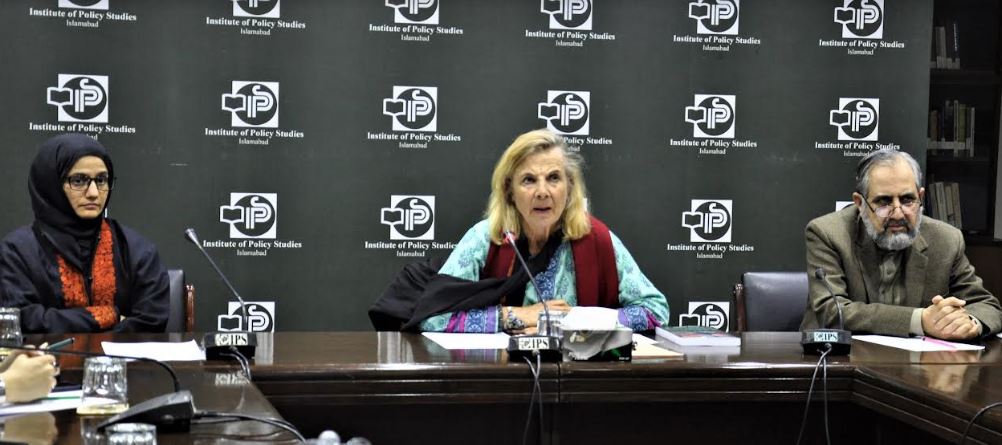Islamabad, Feb 28 /DNA/ – The Kashmir conflict is ingrained with numerous constraints and complexities, and it only continues to get more and more compounded as time passes. The conflict demands the international community’s attention and arbitration to be resolved for the sake of the millions of lives of the region’s inhabitants, and the peace the people of Pakistan and India deserve to progress for the future.
These views were expressed by Victoria Schofield, an eminent British historian, author, scholar and biographer with a particular interest in South Asia and Kashmir conflict, during an exclusive talk held at the Institute of Policy Studies (IPS) on the topic of ‘Kashmir: The Way Forward’.
Schofield, who has visited both sides of the disputed territory many times and had opportunities to interview locals from both sides to ascertain their opinion regarding the whole situation, lamented that the people in the Indian occupied territory were still living traumatic lives, there were a number of civilian deaths and arrests every day, and armed soldiers roam the streets.
The speaker termed the whole situation a grave humanitarian crisis that needs the urgent attention of the world community, pressing that these human rights violations in IOJK need to be documented and reach the right places on a consistent basis.
Schofield also reminded that the Simla Agreement does not bind Pakistan and India to resolve the Kashmir conflict only through ‘bilateral means’.
She said, the Agreement states that both the countries will try to resolve the issue bilaterally or through any other mutually agreed means. She stressed that this latter clause in the agreement needs to be highlighted to seek international mediation over the issue, which is critical as India’s hubris has continued to obstruct an amicable and bilateral resolution to the pain and suffering of the people of Kashmir.
She further opined that the resolution of this over 75-year-old issue needs to involve multiple stakeholders, including China because of its claim to Aksai Chin and Trans Karakoram Tract.
She was of the view that the people of Azad Jammu & Kashmir and the Gilgit-Baltistan region, the Indian-Occupied Jammu, Kashmir Valley and Ladakh region may not necessarily have a similar opinion over the matter.
The session presided over by the IPS’ Vice Chairman Ambassador (r) Syed Abrar Hussain, was also joined by Ambassador (r) Ishtiaq Hussain Andrabi, Brigadier (r) Said Nazir Mohmand, Farzana Yaqoob, former AJK minister and secretary, IPS-Working Group on Kashmir, Syed Abu Ahmad Akif, former federal secretary, and Advocate Nasir Qadri, founder, Legal Forum for the Oppressed Voices of Kashmir (LFOVK), among others.
Several young activists hailing from the Indian-occupied territory of Jammu & Kashmir, including Dr Mujahid Gilani, and Ahmed bin Qasim, the son of long detained Kashmiri leaders Qasim Faktoo and Asiya Andrabi, also participated in the discussion after the talk.
The Kashmiri youth partaking in a session also voiced their opinion, stating that the ongoing human rights violations in Kashmir were just the symptoms emerging from the disease of illegal occupation. Its status quo was being protected by the Indian government, bureaucracy, military, and legal institutions together.
In his closing remarks, Ambassador (r) Syed Abrar Hussain stated that Pakistan has always tried to seek a resolution to this issue both through dialogue and in the form of international mediation on a number of occasions. India however remains adamant in its unilateral stance, he added.
He reiterated that Kashmiris are the principal party to the international conflict, and no resolution would be achievable without empowering them with their right of self-determination.

















